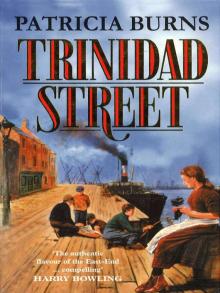- Home
- Patricia Burns
We'll Meet Again Page 14
We'll Meet Again Read online
Page 14
‘Yeah! Gotcha!’
The big plane juddered round and levelled out just as another burst of fire was heard and Nev’s triumphant yells were cut off in mid-stream.
‘Nev?’ came the skipper’s voice. ‘Come in, Nev. Nev, are you there?’
There was no reply.
Tom looked at Squiff. What he could see of his face was very white.
‘Nev’s bought it,’ he said.
‘Shit,’ said Tom. ‘Shit, shit—’
‘ET? target?’ Chip’s voice cut in.
There was no time for Nev now.
‘Eight minutes, Skip.’
They were level and steady now, lining up for the final run-in. The bomb doors were open and below them the city lay ablaze. Tom had to tear his mind away from imagining the searchlights probing the sky, the ack-ack aimed at them, the fighters circling for the kill.
‘Right, steady, left a bit, left—’ came Mike’s voice, calm and cool as he talked them into position.
The plane rocked as a shell exploded right alongside them.
‘Steady, steady—’
Spent shrapnel rained down on them. Up on top, Mac was firing away.
‘Left a bit—’
Just as Mike said ‘Now!’ and released the bombs, the plane reared up as the load fell away and part of a shell hit one of engines. Tom could hear Chip cursing as he fought to keep the plane straight and level while Mike took the aiming point photograph and checked that all the bombs had gone. It only took thirty seconds, but it was always the longest thirty seconds of the entire trip. If they hadn’t released all the bombs, they had to go round and try again. If they had, then they could head for home. Tom found himself counting … Another shell exploded almost next to them and the plane bucked and juddered.
‘Christ—’ Squiff yelped.
‘Bombs gone. Let’s go!’
Slowly the damaged plane banked round and made to join the stream of homebound bombers. Tom braced himself for further attacks from fighters. They must be marked out as prey now that they had been hit. He could hear Mike cursing as he struggled to get the bomb doors closed. Something in the mechanism had jammed. Tom concentrated fiercely on the job in hand. What was their ETA for home? They had a tail wind for the return journey, but only three engines … He calculated one against the other ready for when Chip wanted the information, all the while trying to block out the sense that all was not well with V-Victor. She didn’t feel right. She didn’t sound right.
And then everything seemed to happen at once. There was the scream of a fighter and the rattle of gunfire and V-Victor slewed to one side. Through his headphones Tom could hear muffled shouts and cries from the cockpit, and then the flight engineer saying, ‘I’ve got her, I’m holding her—’ He had hardly a moment to guess that the fighter had shot up the cockpit before there was a ripping noise right behind him and a stench of cordite. A large hole appeared in the fuselage. Beside him Squiff cried out and slumped over his desk. The radio was sizzling and giving off the stomach-turning smell of an electrical fire.
‘Squiff?’
As he reached out to help his mate he felt something slam into his shoulder with a pain like a hot wire and at the same time the plane lurched and threw him across the cabin bulkhead. They were dropping rapidly. V-Victor was out of control. The intercom went dead, but from the cockpit he could hear the flight engineer yelling, ‘Bale out! Bale out!’
Tom crawled up the sloping floor to where Squiff was now flopping half off his seat. He grasped him under the arms.
‘Come on, mate, come on—’
The radio burst into flames. By its lurid light, Tom saw that it was too late to save Squiff. Laying him down, he made for the bomb doors, mercifully still jammed open. The whole plane was screaming and rattling as it fell through the sky. Things fell on him. Smoke was billowing through the cabin. As he reached the bomb doors, Mike was there. Below them the black night was lit by the fires they had started. The city was burning. Streaks of flak were shooting up towards them. The rush of air buffeted them.
‘Where’s Squiff?’
‘Bought it. Chip?’
‘Him too. Get out, mate, now—’
Mike pushed him. He pitched forward into the emptiness. Something slammed into his side, taking his breath away. He was tumbling through the air with just enough sense left to count and pull the rip-cord before he passed out.
CHAPTER SIXTEEN
‘ARE you sure you haven’t had anything?’
‘Of course I’m sure,’ Gwen said. ‘What d’you think I am, a liar?’
‘No, of course not, it’s just …’ Annie said.
‘Just what?’
‘Nothing … well … I was expecting to hear from him by now, that’s all.’
‘That’s the trouble with a boyfriend who’s away. All you get are letters,’ Gwen said smugly.
‘Yes …’ Annie agreed.
‘Of course, Johnny’s not in the RAF like some, but at least he’s here. He can take me to the pictures on a Friday night, and dancing on Saturdays …’
‘Yes,’ Annie repeated.
She listened with half an ear while Gwen prattled on about the boyfriend she had acquired. Friendship required that she should appear to be interested in what Gwen was saying, but she was too worried to take in even part of it. Tom should have written to her by now. He had always been a faithful correspondent. Sometimes he would be a day or two late writing, but never this long. The cold well of fear that always lurked in the pit of her stomach began to rise. Was there someone on or near the airfield who had taken him away—some other girl? Or was there another, even more sinister reason? On the news last week they had spoken of a big bomber raid on Milan. Perhaps Tom had been on that. Perhaps … but it didn’t bear thinking about. She closed her mind to the thought of all the planes that didn’t make it back home. Tom was all right. He was sure of that himself, just as long as his plane had lucky Mike on board.
‘So are we going to the pictures, then?’ she interrupted Gwen.
Gwen sighed. ‘I told you, I’m going with Johnny,’ she said. Then, seeing Annie’s disappointed face, added, ‘Look, when Tom’s here, you go out with him, don’t you?’
‘Yes,’ Annie admitted.
But it had been such a very long time since she had seen Tom. And now he hadn’t written …
‘I don’t think I’ll be able to get into town till next week now,’ she said.
Another whole week to wait till she heard from Tom. She didn’t know how she was going to bear it.
‘Tell you what,’ Gwen said. ‘If I get anything, I’ll cycle down to the sea wall and, if I can’t see you, I’ll leave it under a stone or something on the veranda of Silver Sands.’
Annie flung her arms round her, tears pricking at the backs of her eyes.
‘Oh, thank you, Gwennie darling. You’re the best friend in the world, d’you know that?’
‘Yeah, well—’ Gwen said. ‘You’re potty, you are. Potty about him, anyway.’
Three days dragged by and at midday and early evening Annie kept looking across the flat fields towards the sea wall. Sometimes people would appear and walk along it for a while, often with a dog in tow, but none of them was Gwen. Each day she went and checked the veranda at Silver Sands anyway, just in case Gwen had been and she hadn’t seen her, but there was nothing to be found but leaves and twigs blown into heaps and corners on the deserted chalet. A sick feeling of dread was slowly building up inside her. Something was wrong—something was dreadfully wrong for Tom to be silent this long.
On the fourth day it rained steadily all day, a thin grey rain that cut through all protection just as effectively as a downpour. Her father spent all afternoon tending a cow which was having a difficult birth, so Annie was left with the afternoon milking to do single-handed. When she had finally got through all the scrubbing down, she went into the barn, to find the new mother licking her calf clean. One look at her father told her that it was not good news.
‘A bull?’ she ventured nervously.
Walter grunted and picked up his old coat from the nail on the wall.
‘What does it look like?’ he growled.
Annie glanced at the calf. It was a bull. Bull calves were no use to a dairy herd.
‘Let’s—let’s hope the next one will be a heifer,’ she ventured. Another of their cows was due to calve in two weeks’ time.
‘What’s the point of hoping? Won’t change nothing,’ Walter snapped and strode off towards the house.
Annie trailed unhappily behind. What was the point of hoping? But she couldn’t help looking over the fields towards the sea wall before going into the house. In the gloom of the day, she could hardly make out where the land met the sky. She couldn’t believe that Gwen would have cycled all the way down to Silver Sands in this, and yet … she could not quite give up.
Tea was a silent meal. Her mother, ever aware of her husband’s moods, said nothing beyond asking whether he wanted more of anything. Walter chewed his way through his food as if he were eating a mortal enemy. Annie kept her eyes on her plate, her mind on Silver Sands. She pictured the veranda, the damp leaves, the big stone from the garden that she had left there on purpose. She pictured an envelope underneath it, an envelope with her name on it, in Tom’s writing. Maybe if she believed in it strongly enough, it would happen …
At last she was free to tramp across the fields. She put on her sodden mackintosh and set out. She had walked this route so many times before. Last year when Tom had been waiting for her at the chalet, she had raced across the grass and hardly felt her feet touch the ground. Now her legs were heavy and every step was an effort. She dreaded finding the hiding place bare once again.
Silver Sands was a sad sight. It was three years now since it had last been done up and the paint was beginning to peel. Whoever it was that the Suttons had sold it to didn’t seem to care about it at all. The brambles from the overgrown garden were reaching long tentacles on to the veranda and one of the bedroom windows was hanging open. The practical side of Annie’s mind made a mental note to bring a hammer and nails next time she came to nail it shut. Once the weather got in, the place would be ruined. She rounded the corner of the veranda to the seaward side, where all thoughts of house maintenance flew out of her head as her eyes focused on the stone …
‘Yes!’ she cried out loud.
She ran, her feet slipping on the wet wood, and snatched the precious blue envelope. He had written, he had written, he …
Dread clutched at her heart. The writing, smudged from being under the damp stone, was not Tom’s.
Annie stared at it. She felt cold and sick and clammy. Her breath came in short gasps. Please, she prayed, please don’t let this be it …
With trembling fingers, she opened the envelope and drew out the one sheet of paper inside. For a long moment she stood holding it, wanting to delay the moment of knowing, wanting to hold back time. But in the end, it had to be faced. Slowly, she unfolded it. Already a terrible pain was beginning to wrap itself round her entrails.
Dear Miss Cross,
I’m very sorry that I have to write to you with bad news. I don’t suppose you’ll be getting an official notification, but I know Tom would want you to know.
We went on a big raid last night and ran into a very hot reception. Tom’s plane was hit and went down. There was such a lot going on that I’m not sure exactly what happened, but I do know that I saw some of them bale out.
I’m really sorry to have to tell you this, Miss Cross. I haven’t known Tom for long, but you get to know people pretty quickly in a place like this where you’re living on top of each other all the time, and Tom is one of the best. Him and me hit it off straight away, and the rest of the boys liked him a lot too.
He didn’t say a lot about you but I know he thought the world of you. He’s a tough lad and if he did manage to bale out then he’s got a good chance of surviving. I’m keeping my fingers crossed for him.
Again, I’m really sorry to have to be the one to tell you this.
Yours sincerely,
Alan Mitchell.
Annie’s knees were shaking. Slowly, she crumpled the letter in her numb fingers and clutched it to her chest.
‘No—’ she whispered. ‘No—no—’
She felt as if her body were being ripped apart and a huge piece torn away, leaving her bereft and defenceless. Hit and went down—hit and went down—the words whirled round and round in her head. No Tom, no Tom—how could she bear it? The strength seemed to have gone out of her legs. She slumped on to the wet veranda floor with its scattering of slimy leaves and doubled over, letting out a howl of anguish.
There was no one to share her grief. Her mother was too sunk in her own pit of despair to notice Annie’s dark mood or, if she did, she was unable to reach out. Her father only remarked on it to criticise her.
‘What’s the matter with you? Cat got your tongue? Turn the milk sour, you will, with a face like that.’
And when Annie didn’t answer, she got his heavy hand across her head for insolence.
She wasn’t sure how she got through the next day, but in the evening she had a visitor. Gwen arrived at the kitchen door, shifting from foot to foot, her voice high with nerves, but there all the same.
‘I’ve come to see Annie,’ she announced, not quite meeting Walter’s eyes.
A sob rose in Annie’s throat. She jumped up and bolted for the door, grabbed Gwen by the wrist and dragged her into the hay barn.
‘What’s—?’ Gwen asked, but got no further. Annie leaned against her friend’s solid frame and wept. It was such a relief to let go. Gwen’s shoulder was warm and firm, her strong arms went round her and held her, rocking her gently and talking to her. At length, her words came through to her.
‘Poor Annie, poor love, don’t cry, Annie darling, please don’t cry—’
It was a long time before she was able to stop, her eyes and face swollen, her throat sore, her breath coming in harsh sobs.
‘Better now?’ Gwen said hopefully.
Annie nodded, though it wasn’t. Nothing was ever going to make it better. But the crying had helped. Gwen sat them both down on the warm hay. The sweet smell of it was all around them and it whispered as they shifted.
‘I was worried it was bad news when I saw the writing. That’s why I left you the note,’ Gwen said.
‘Note?’ Annie managed to ask. She didn’t know what Gwen was talking about.
‘Under the stone. With the letter. Didn’t you see it?’
Annie shook her head. She hadn’t noticed anything but her letter.
‘Was it—? I mean, is he—?’ Gwen asked. She stopped, unable to put it into words.
‘I don’t know,’ Annie told her.
‘You don’t know? But what—?’
It was difficult to get the words out. Annie had to force them, one by one.
‘His plane … was … sh-shot down. S-some of them … baled out. They don’t know … who …’
‘Oh, Annie—’ Gwen sighed ‘—I’m so sorry.’
Sorry. The gross inadequacy of the word set off a fresh rush of tears. Gwen stroked her head and rubbed her back and waited for her to stop. When she did, Gwen had something more to say.
‘But look,’ she said. ‘It could’ve been him, couldn’t it? He could’ve got out, and parachuted down, or whatever they do. He could be alive. Where was they when … when it happened?’
It was only then that it struck Annie that she didn’t know. Nothing had been said in the letter. If Tom was alive, she didn’t know where he was. It made her feel helpless all over again.
‘Germany somewhere, I s’pose,’ she whispered.
The very word sent a fresh chill through her. If Tom wasn’t dead, he was in the hands of the enemy, deep inside their territory.
‘Oh, Gawd,’ Gwen said. ‘But look, at least he’ll be safe, won’t he? He’ll be a POW. My aunty’s brother-in-law’s a POW. He says at least he’s not get
ting shot at no more.’
The small glimmer of hope wound itself around her heart. Annie nodded.
‘Yes,’ she whispered.
Maybe he had survived. Maybe he was safe.
‘But how will I know?’ she asked. ‘They won’t tell me. It was a friend of his what wrote. Would he know? How do I find out?’
‘I think they only tell the next of kin,’ Gwen said. ‘But look—you could write to his parents, couldn’t you? Ask them. They’d tell you, surely, if they heard anything?’
The hope grew a little stronger. Here was something she could actually do. It was so much better than just asking endless unanswerable questions of herself.
‘Yes,’ she said. ‘Yes, I could. Oh, Gwen, you’re the best friend anyone ever had. I don’t know what I’d do without you.’
Gwen gave her a hug. ‘Keep your pecker up,’ she said.
Working out the exact wording of the letter became an obsession. Annie could think of nothing else. Whether she was tending the animals, working in the fields or helping her mother in the house, she kept going over and over the possible combinations of words. Sometimes it seemed too hard to do at all but she knew that she must get it right, put it down on paper and send it off. It was as if doing so was keeping Tom alive.
Finally, after writing, crossing out and re-writing half a writing pad, she managed a short polite note. She still wasn’t happy with it, but she had to get something finished before her one chance in the week to get to the post box. She dropped it in and instantly regretted it. What were Tom’s parents going to think? Would Tom disapprove of her writing to them? But it had to be done. She had to snatch at the only chance she had of knowing what had happened to him. Now all she could do was wait.
She went each day to Silver Sands, even though she didn’t expect a reply at once. The weather cheered up and gave everyone a series of bright autumn days with misty mornings followed by blue skies and warm sunshine. In the evenings, Annie walked across the fields as the mist began to form again and sat for a while on the veranda of the wooden chalet or at the base of the sea wall. Nobody ever came by, so she was able to withdraw deep inside herself and remember her time with Tom. They had been so few, the hours they had spent together, and yet so intense that practically every minute was etched upon her memory. If she concentrated hard enough, she could practically sense his presence there with her, hear his voice and feel his arm round her shoulders. Sometimes it was a comfort, sometimes it just brought it home to her even more clearly just what she might have lost.

 Packards
Packards Bye Bye Love
Bye Bye Love Follow Your Dream
Follow Your Dream Trinidad Street
Trinidad Street We'll Meet Again
We'll Meet Again